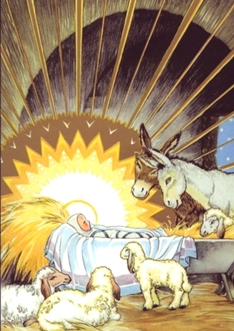
December
9
Isaiah 60:7 (continued). “They shall ascend with good pleasure on My altar, and I will adorn the house of My adornment.”
For the children from Luke 1
8. But it came to pass that while he exercised the priest’s office in his daily service before God,
9. according to the custom of the priest's office, it was his lot to burn incense when he went into the temple of the Lord.
10. And all the multitude of the people were praying outside at the hour of burning incense.
11. And there appeared to him an angel of the Lord standing on the right side of the altar of incense.
12. And Zacharias was disturbed at the sight, and fear fell upon him.
13. And the angel said to him, Fear not, Zacharias, for thy prayer is heard, and thy wife Elizabeth shall give birth to a son for thee, and thou shalt call his name John.
14. And thou shalt have joy and gladness, and many shall rejoice at his birth.
15. For he shall be great in the sight of the Lord, and shall drink neither wine nor strong drink; and he shall be filled with the Holy Spirit, even from his mother's womb.
16. And many of the sons of Israel shall he turn to the Lord their God.
17. And he shall go before Him in the spirit and power of Elijah, to turn the hearts of the fathers to the children, and in the prudence of the just to make ready the disobedient, a people prepared for the Lord.
Readings from the Heavenly Doctrine
AR 277. There were two altars, one for sacrifices and the other for incense. The altar of incense was within the tabernacle, and was called the golden altar, but the one for sacrifices was outside the tabernacle, and was called the altar of burnt-offering. The reason was because there are two kinds of goods from which all worship exists, celestial good and spiritual good. Celestial good is the good of love to the Lord, and spiritual good is the good of love towards the neighbor. Worship by sacrifices was worship from celestial good, and worship by incense was worship from spiritual good.
AE 391:9. This [Isa 60:7] treats of the Lord’s coming, and it is said of the Lord Himself. “They shall come up to My altar with acceptance; thus I will adorn the house of My adornment” signifies the Lord’s Divine Human, in which they will be. The “altar” signifies His Divine Human in relation to Divine good, and “house of adornment” the same in relation to Divine truth. That the Lord in respect to the Divine Human is here meant is evident from the preceding part of that chapter, where it is said that “Jehovah shall arise upon Thee, and His glory shall be seen upon Thee,” with what follows, which describes the Divine wisdom with which the Lord will be filled in respect to His Human….
[10] As “the altar” signifies in the highest sense the Lord’s Divine Human, “altar” therefore signifies also heaven and the church; for the angelic heaven, viewed in itself, is from the Divine that proceeds from the Lord’s Divine Human. From this it is that the angelic heaven in the whole complex is as one man. Therefore that heaven is called the Greatest Man…. And as all worship is from the Lord—for it is the Divine communicated to man from the Lord, in which is the Lord Himself—thence “altar” also signifies in general everything of worship that proceeds from the good of love.
| previous |  |
next |
|---|
